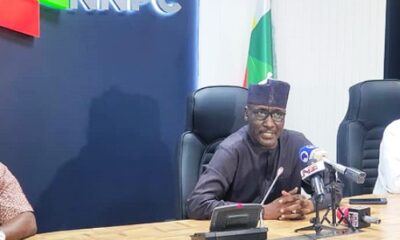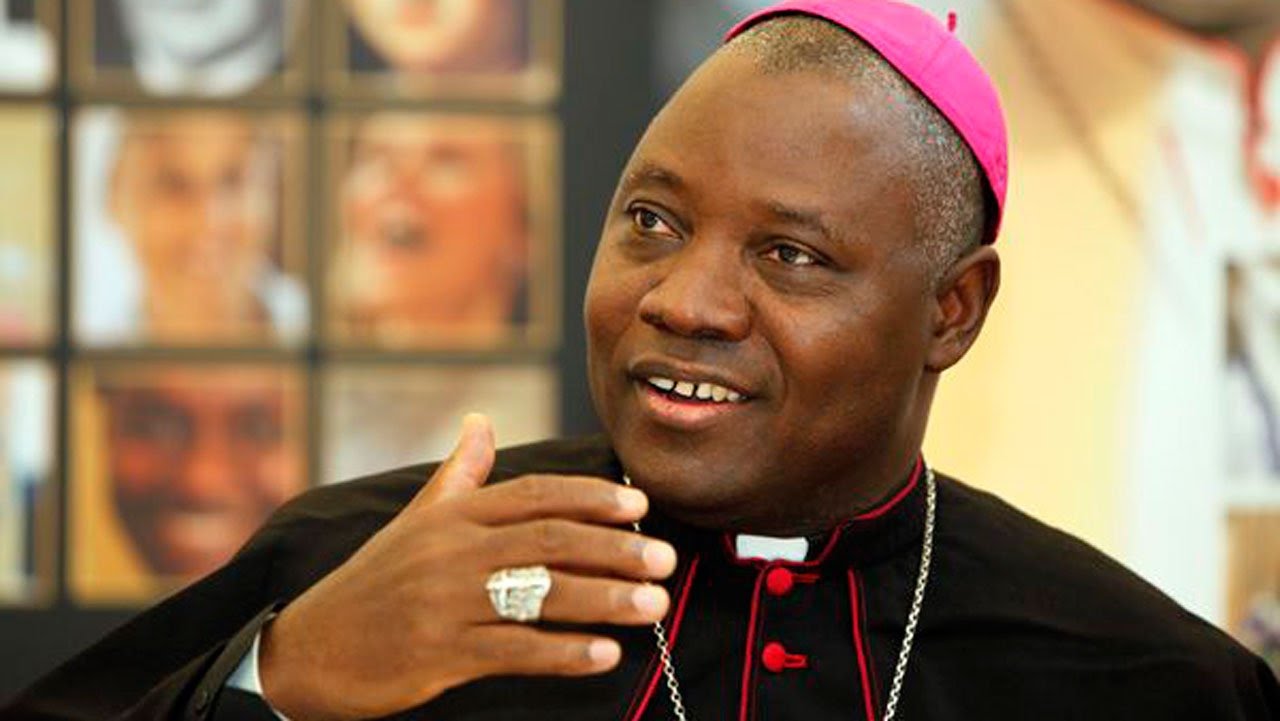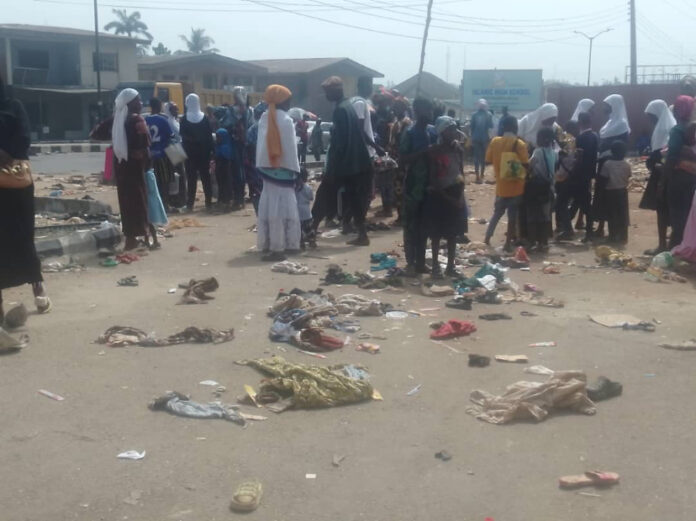There are indications that the persistent fuel scarcity in the country may take a long time to end as a meeting involving the Federal Government, Nigerian National Petroleum Corporation, Department of Petroleum Resources, Major Marketers Association of Nigeria, MOMAN, Independent Petroleum Marketers Association of Nigeria, IPMAN, ended with no clear road-map.
But the major players in the oil industry yesterday, attributed the fuel scarcity in different parts of the country to the increase in crude oil price at the international market and the removal of subsidy.
This came as the Minister of Petroleum Resources, Dr. Ibe Kachikwu has said that no single marketer has been identified as being behind the fuel scarcity that has brought untold hardship to Nigerians during the Yuletide.
Meanwhile, a source at the meeting revealed that the issue of subsidy removal was not discussed at yesterday’s meeting, as a sub-committee set up at the meeting was directed to find an immediate solution to the fuel crisis, while the committee is to meet today.
A source at the meeting also hinted that President Muhammadu Buhari had ruled out any fuel price increment and payment of subsidy to marketers.
The sources added that local refining dominated yesterday meeting, while marketers it was learned asked for the payment of the outstanding N800billion debt, owed them by the Federal Government. Briefing State House correspondents after a meeting between the oil stakeholders and government representatives on the instance of the Chief of Staff to the President, Abba Kyari, Chairman of Depot and Petroleum Products Marketers Association of Nigeria, DAPPMA, Dapo Abiodun explained that marketers were finding it difficult to import the petroleum products because of the increase in the price of crude.
He said: “Today’s meeting was called at the instance of the Chief of Staff to the President and it was to find out exactly what happened, where we had the problems we had in December with the supply of petrol and how Nigerians were made to go through the pains and suffering.
“He wanted to know the truth and to ensure that going forward, this problem will be solved once and for all. And that is why you saw that we sat in here from 2pm and the meeting just finished after three and half hours.
“A lot of issues were raised and a committee was constituted that will be meeting tomorrow (today) under the chairmanship of the Minister of State, Petroleum to further ensure that these problems do not reoccur.
“From our point of view as marketers, we made our submission known to government and we emphasized the fact that this was not a marketer-related problem. There was no hoarding on the part of any marketer.
“Marketers are your brothers, they are Nigerian citizens, they are businessmen, no marketer makes money from hoarding petroleum products, our business is to take petrol and sell.
“We explained that the problem that you saw is not wilful on the part of anyone either NNPC or marketers. The situation from our point of view is that from January to December, the price of crude remained relatively stable. Following the hurricane Katrina in the month of September, October, crude prices went up and marketers lost the ability to import and sell at N145 per litre.
“In the past, marketers bring in about 60% while NNPC brings about 35 to 40 per cent. But by the month of October, marketers completely stopped importing because there was no more subsidy, so we can’t sell for profit and we have to stop importing. The burden of importing 100% now fell on NNPC.
“You can imagine a situation where NNPC was importing in part and marketers were importing in part and then suddenly NNPC begins to import 100%.
“NNPC is suddenly finding itself importing what they probably didn’t expect in terms of volume and the fact that Nigerians are consuming more volume that they will normally consume in earlier months.
“Coupled with the fact that the countries that are surrounding us as a nation are all selling fuel at more than $1 per litre. $1 today is about N360. If you go to Cotonou, Ghana, Niger so it’s not unlikely that some of our petrol is finding itself across the body to these countries.
“All these are issues we believe amounted to what we saw in December but thankfully NNPC rose to the occasion, they stepped up import, stepped up supplies. That situation has since normalized.
“Today’s meeting is to ensure that this does not happen again and this we are going to continue tomorrow in the committee that was set up under the chairmanship of the Minister of State for Petroleum to ensure that we find a long-lasting and enduring solution to this problem so that Nigerians will not have to go through this borrowing situation again.”
On whether the issue of subsidy which was the core of the problem was discussed at the meeting, he said, “Well, like I said to you there is no subsidy at the moment. The government in its wisdom has decided that the N145 cap will remain because of what they consider will be the consequences on Nigerians.
“This is a government of the people and they believe Nigerians should not be made to buy fuel for more than N145. So if that is to remain then we have to find other ways to manage the situation so that we will continue to sell fuel at N145.
“As far as we are concerned there is no subsidy in the budget; as far as we are concerned marketers cannot import and sell at N145. So government has to find a way and ensure that marketers themselves importing alongside NNPC and still sell at N145. So when we meet with the minister tomorrow we will find solution to see how that can be sustained.
“The Minister also said no marketer has been prosecuted in line with President Muhammadu Buhari’s directive because there has not been any evidence of culpability on any of them.”
The Minister of State for Petroleum, Ibe Kachikwu said the whole idea of the meeting was to do a centric analysis of what really went wrong.
He said “Like you know for over two years we have been out of this problem, it’s been working well, NNPC has been managing it properly and suddenly there was this gap.
“So they wanted us to put heads together to find out what went wrong. It’s not a fault finding meeting; it’s about how we take corrective measures to avoid that and what are the things that are creating difficulties in the system.
“Because fuel scarcity has been ever lingering 30, 40 year old thing and I think it is to the credit of Mr. President and his government over the last two years that we haven’t had any of this through his policy that he has enunciated.
“So that was the objective of today’s meeting. Everybody gave ideas, everybody was collaboratively finding solutions.
“The GMD started by presenting what the scenario was. At least for now it has taken away the fuel queues that you see. We then dug into the long-term solutions and everybody contributed.
“We set up a committee which I will head. Members include the GMD, most of the parastatals in the ministry, DAPMAN, IPMAN, NOMAN, Labour unions, and we are to meet in my office tomorrow and dig deeper into this thing and find a long term solution.
“This is a major concern that Nigerians should not be made to suffer, that Nigerians do not get through the kind of thing they went through this December. We want to find lasting solution and that is what the committee will come out with in the resolutions tomorrow.”
When asked whether all the erring marketers during the dark period were found and sanctioned, he said, “The thing is even the Nigerians who have suffered. We will want to be sure that we find a lasting solution and find evidential basis upon which to punish people. This is a democratic government.”
While answering another question if there was no evidence with all the things Nigerians went through, he said, “I don’t have one yet if you have one I will like to have it.”
On the statement by the president that those responsible for the scarcity were largely blackmailers, the Minister said, “I feel your pain, we share in those pains but we are going to find lasting solution. they are people who are culprits they will be identified, in fact the chief of staff instructed that specific names should be put on the table, those who have gone against the rule, done certain things that are against the book should be punished. But the greatest difficulty in Nigeria is that people make allegations, and when you then ask for evidence, everybody now goes back into the safety nets.
“You cannot prosecute except you have evidence; I’m 30 years old as a lawyer. So we will need to find that evidence, we will definitely punish those who did things that are wrong, but more fundamental and more importantly is that we want to find lasting solutions and we all want to work more collaboratively.”
Text Credit: Vanguard

 BIG STORY1 day ago
BIG STORY1 day ago
 BIG STORY1 day ago
BIG STORY1 day ago
 BIG STORY4 days ago
BIG STORY4 days ago
 BIG STORY2 days ago
BIG STORY2 days ago
 BIG STORY2 days ago
BIG STORY2 days ago
 BIG STORY4 days ago
BIG STORY4 days ago
 BIG STORY3 days ago
BIG STORY3 days ago
 BIG STORY1 day ago
BIG STORY1 day ago























